|
5 Biggin Street
   
New building 9 Biggin Street

Dover
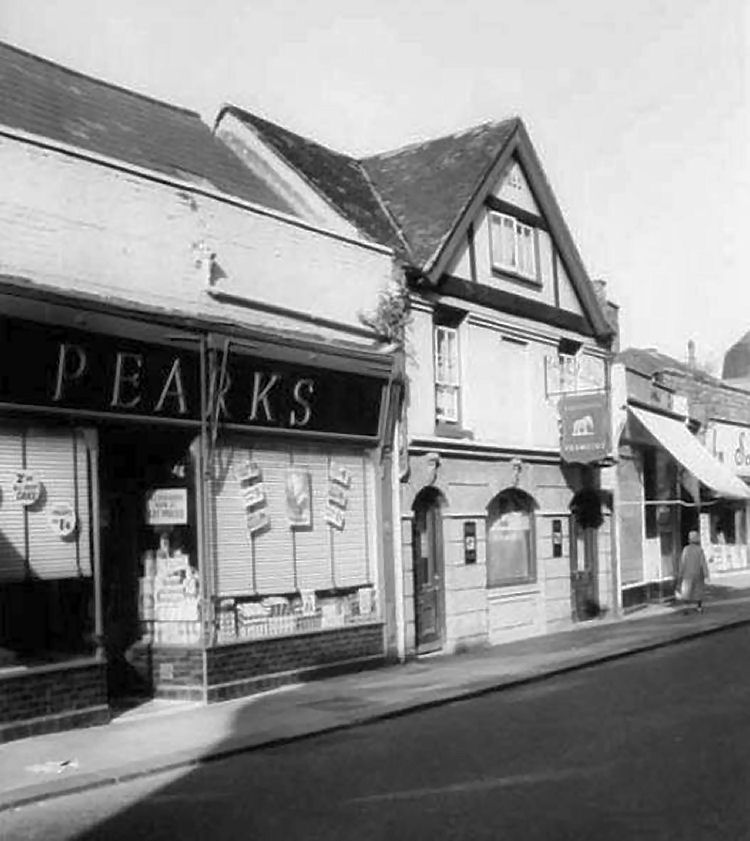
Above photo date unknown, kindly sent by Paul Wells. |
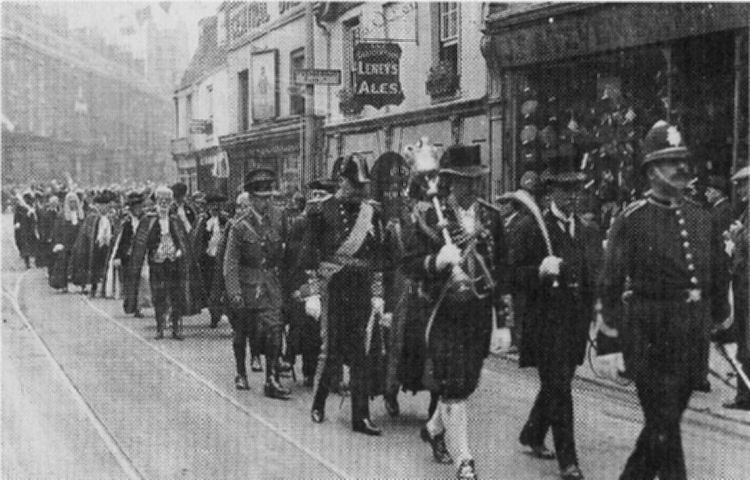
The original Salutation during a Mayors procession, 1923,
showing a meeting of the Brotherhood and Guestling, attended by the Lord
Warden Earl Beauchamp. Photo
by kind permission of Dover Library. |
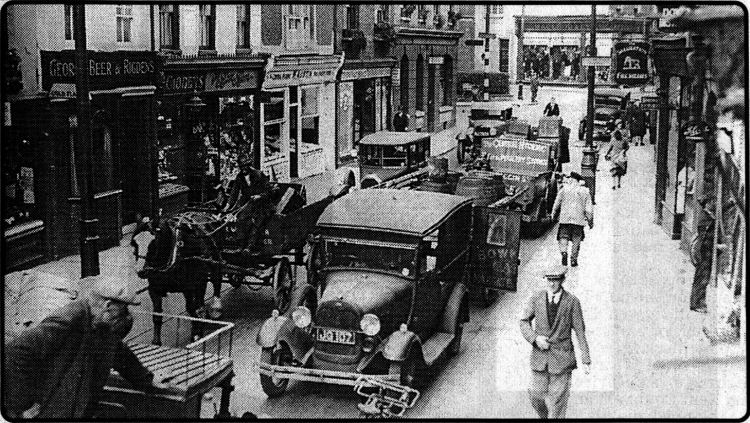 |
|
Salutation above shown on right in the early 1930s. On left can be see the
"British Queen" and in the middle (same side) the "Prince Albert". |
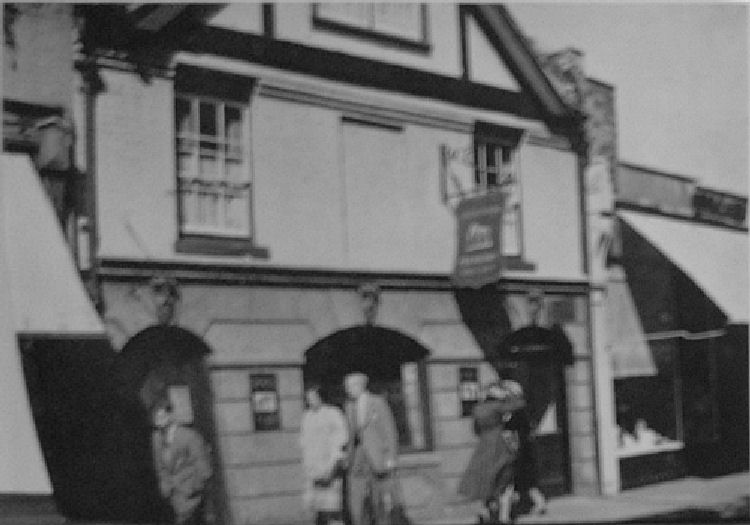 |
|
Above shows the old Salutation, date unknown.
|

Above photo, date unknown, kindly sent by Kenneth Chapman. |
|
Kentish Chronicles, 31 January, 1794.
Last week died Mr. Bowles, landlord of the "Salutation" public
house, in Biggin Street, Dover. He has left behind him £340 in good
half pence, and 2 half ankers of bad ones, which he had accumulated
in the course of his business; and so attached was he to this
description of money, that on being once offered a £10 banknote, in
exchange for £10 worth of half pence, by a person in the
neighbourhood, he declared that he would not let his copper go for
paper, but if the gentleman chose to give him £10 in gold or silver,
he would oblige him with the same sum in half pence.
A half anker is the equivalent of a 5 gallon container.
|
|
Kentish Gazette Dec 28 1824.
PETER GOLDSACK.
Inquest at "Salutation", Dover, yesterday morning on body of
labouring man Peter Goldsack aged 83 of West Langdon, who it appeared was
seized with a fit while riding in a donkey cart, from which he fell and
expired. The Jury's verdict "died by the visitation of God". A numerous
progeny will bewail his death, one of his sons having 16 children and
another 17.
|
|
From the Dover Telegraph and Cinque Ports General
Advertiser, Saturday 7 January, 1843. Price 5d.
MELANCHOLY CATASTROPHE
An inquest was held, at the "Salutation," before G. T. Thompson,
Esq., Coroner for the borough, on the body of George Hardwin, aged 49,
wagoner, in the employ of Mr. C. B. Goreley.
Joseph Belsey, wagoner
deposed, that on Sunday morning last, about four o'clock, he, with
deceased, was returning with two wagons from Margate, where we had been
sent with a load on the previous day, and when opposite Victoria
Crescent, deceased called out "Joe." I ran back and found him lying in
the road. He said the wagon had gone over him. I then got assistance and
took him to his house. When I last saw the deceased, near the Chapel at
Buckland, he was walking at the side of his horses. I can not tell how
the deceased came under the wagon, not do I know if he was riding on the
shafts. The wagon and the horses are the property of Mr. Gorely, and the
horses are very quiet. We left Margate to return to Dover about two
o'clock on Saturday afternoon.
E. G. Rutley, surgeon, deposed, that he was called to attend the arm
of deceased broken, and great injury in the abdomen, from which there
was a considerable haemorrhage. The deceased expired in about two hours.
Verdict - "Accidental death, from the wheel of a wagon, with a
deodand of one shilling on the same."
|
|
Dover Chronicles 31 January 1846.
County Magistrates Office. Monday.
(Before H. Russell, Esq., and Aretas Akres, Esq.)
William Davies alias George Gibbs, and James Grores, were brought up
for re-examination, on a charge of offering counterfeit coin.
Mr. Powell, solicitor for the Mint, attended to conduct the
prosecution.
Richard Collard deposed:- At half past 12 o'clock last Wednesday
noon (the 21st instant), the two prisoners came to the public house
which I keep at river, called the "Marquis of Granby," and had a
pint of beer for which the one calling himself William Davis gave me
a shilling in payment, and I gave him the change. They had several
more pints of beer afterwards, and for the last of three of these
Davis tendered me half a crown. I gave him 2s. 4d. change, and they
left shortly after. The next morning the constable came to my house
and asked me if I had taken any bad money. I took out my money, and
found that the half crown I had taken off Davis was counterfeit. It
was the only one I had.
Sarah Bourn deposed:- I am the wife of Thomas Bourne, who is the
landlord of the "Plough," Ewell Minnis, Alkham parish. On Wednesday
last, about 12 o'clock, the two prisoners now present came to the
house and called for a pint of beer, for which the one called
William Davies gave me, as I thought, half a crown. I gave him 2s.
4d change, and put the coin into the drawer, where there were only
sixpences. On the same evening my husband went to Dover, and took
some money with him. When he came back, he said the half crown was
bad. It was the only one we had.
The husband of last witness deposed that he tendered the said coins
to Mr. Phillips, of the "Salutation," who discovered it to be bad.
Sarah Powell daughter of Mrs. Powell River, deposed:- On Wednesday
last, about half past 11 o'clock, the prisoner calling himself
William Davis came to the shop, where I am in the habit of
assisting, and ask for one ounce of tobacco. He gave half a crown in
payment, and I gave him the change - 2s. 3d. When he was gone I
suspected it was bad, but was not sure. I gave it to our man for
change previous to his coming to Dover, without telling him my
suspicions; but he brought it back.
John Johnson, journeyman to Mrs. Powell, deposed to receiving the
half crown (now produced) of last witness, with some silver, as
change, and bringing it back again.
There being no direct evidence against Groves, the Magistrates
directed his acquittal; and he was not long, in consequence, making
his exit from the office. Mr. Powell, however, had a remembrance of
a former case in which Groves had been concerned.
Mr. Coulthard, governor of Dover gaol, deposed that the person now
calling himself William Davis was, in the session of December 1841,
sentenced, by the name of George Gibbs, to 12 months imprisonment
in Dover gaol for issuing counterfeit coin in the parish of St.
Mary.
By the 34th George the 3rd, the first offence of this kind is a
misdemeanour, and the second a felony, which renders the
perpetrator liable to transportation. In consequence of the
present being a second offence, the prisoners was committed to
Maidstone gaol, to take his trial for felony.
|
|
From the Dover Telegraph and Cinque Ports Advertiser,
2 June, 1849.
John Skimetzki, a Pole, was brought up in the custody of
police-constable Scutt, charged with secreting, with intent to steal,
sundry articles of wearing apparel, the property of Mr. Phillips, of the
"Salutation," Biggin Street, and his son - The prisoner being a
foreigner, an unable to speak English, Mr. S. M. Latham officiated as
interpreter during the investigation, at which the following evidence
was given:-
John Phillips jun. - The prisoner slept at the "Salutation" on Friday
and Saturday nights last. On Sunday morning, at about eight o'clock, on
going up stairs, thought I heard some one in my bed-room; and, on
proceeding thither, saw prisoner in the act of opening the door to come
out. Missing two shirts from a box on which I had previously seen them
lying, I collared prisoner, asking him what business he had in my room,
and challenged him with the theft. He partially stripped, to show that
he had nothing about him, and was then allowed to leave the house.
Almost immediately afterwards a pair of stockings were found concealed
between the mattress and sacking-bottom of prisoner's bed, when a
policeman was sent for, and the prisoner taken into custody. Seeing that
my keys were disturbed on the previous night, I suspected all was not
right, and had kept a look-out on the prisoner's movements. On the
arrival of the policeman we went up stairs together, and he discovered
two shirts of mine and a neckerchief, concealed in a corner beside the
bed in the prisoner's room, which was adjoining mine. It was not the bed
in which the prisoner had slept, but another bed in the same room. A
jacket belonging to my father, and a shawl, were also found concealed
among the bedding. No other lodger had slept in the house while prisoner
was there. - This evidence, in respect to the concealment of the
clothes, were corroborated by Matilda Martin, a servant at the
"Salutation," and police-constable Scutt.
Prisoner pleaded his innocence of the charge, and stated that he had
left the house, and was near the Market Place when apprehended -
Committed for trial at the ensuing quarter sessions.
|
|
From the Dover Telegraph and Cinque Ports General
Advertiser, Saturday, 12 December, 1846. Price 5d.
DEATH
Dec. 8, suddenly, at Dover, Mrs. Phillips, wife of Mr. Phillips,
landlord of the "Salutation Inn," aged 38
|
|
From the Dover Telegraph and Cinque Ports General Advertiser, Saturday, 23 February, 1850.
DOVER PETTY SESSIONS
Hannah Clark, remanded on Friday on a charge of stealing from the
“Salutation,” in Biggin Street, two old stockings, was again brought up
before the Bench, but Mr. Phillips, the owner of the property stolen,
declined to prosecute, the prisoner was discharged after some salutary
advice from the Magistrates in reference to her future mode of conduct. |
|
From the Dover Telegraph and Cinque Ports General Advertiser, Saturday,
6 February, 1858.
TO BE SOLD
By direction of the Executor of the late Mr. Matthias Rigden Kitham.
1. That well known Inn or Public House called the "Salutation," with the
stabling for ten horses, outbuildings, ground, and appurtenances
belonging, thereto, with room for four cottages, or other buildings,
behind the same, situate in Biggin Street, Dover, now occupied by Mr.
Thomas Eves. This property has been an established Inn for centuries
and is well situated for a very extensive business. |
|
From the Dover Express and East Kent Intelligencer,
9 September, 1865. Price 1d.
A SOLDIER IN SEARCH FOR HIS GLOVES
Robert Houghton, a young fellow in the uniform of the Royal
Artillery, was next placed at the bar, having been found on the premises
of Mrs. Exes, "Salutation Inn," Biggin Street, and being suspected of an
unlawful purpose.
It appeared that the defendant had been found at two o'clock in the
morning in one of the upstairs apartments, after the whole of the
family had gone to bed; and as he had been unable to give a satisfactory
account of himself he had been given into custody.
Supt. Coram said, in answer to the Bench, that there was no reason to
suppose the defendant intended to commit a felony, and the only reason
he had been given into custody was because he was unable to give
anything like a satisfactory account of himself. From what he had since
ascertained, he believed the defendant was paying a visit to the servant
girl.
Police-constable Company, who had taken defendant into custody, said
he must have scaled the front of the house and got in at one of the
upstairs windows, which had been left open.
A sergeant of the defendant's battery, who was in attendance, said
the defendant was a good, steady man, and had never been in custody
before.
The defendant said he had been at the "Salutation" all the previous
evening, and he believed he must have returned at the time he was found
as described in search of his gloves, which he had missed after leaving
the house. He had taken a great deal to drink, and was hardly aware of
what he was about.
Sir Luke Smithett asked the defendant if he knew anything of the
servant girl?
Defendant admitted, with some show of reluctance, that he had spoken
to her in the course of the previous evening.
The Sergeant, in reply to the Magistrates, said the defendant would
be punished by the military authorities for being absent from his
quarters. He had had a pass which extended to 12 o'clock only, and he
would therefore be punished for being absent without leave.
Under these circumstances the Magistrates cautioned the defendant and
handed him over to the military authorities.
|
|
From the Dover Express and East Kent
News, Friday 21 June, 1867.
THE FORGE
A letter was read from Mr. Archer, of the "Salutation," stating that
damage was done to his property in pulling down the forge in Biggin
Street. He stated that he had mentioned the matter to the Surveyor and
expected that compensation would have been allowed.
The Town Clerk said this was the first he had heard of a claim for
compensation, and had requested the claimant to put it in writing.
The matter was referred to the town Clerk.
|
|
Whitstable Times and Herne Bay Herald, Saturday 16 January 1869.
Coroner's Inquest.
On Friday afternoon the Borough Coroner, W. H. Payn, Esq., held an
inquest at the "Salutation Inn," Biggin Street, on the body of a woman
named Ann Whitehead, who had died suddenly at the "Queen's Head" lodging
house, in the same street.
After hearing the testimony of Mr. John Walter, surgeon, who was called
in, the jury returned a verdict of "Death from natural causes."
|
|
From the Dover Express and East Kent News, Friday, 11 August, 1871. Price 1d.
A WORKMAN IN TROUBLE
John Pratt, a man in the employ of Mr. Stiff, builder, was charged with
being drunk and disorderly and with causing an obstruction of the
footway in Biggin Street, on the previous Saturday evening.
Police-constable William Corrie deposed: On Saturday night last, at
about a quarter to eleven, I was on duty in Biggin Street, when I saw
the prisoner in front of the “Salutation.” There was a crowd of people
round him, and he was standing in the middle of the footway with his
coat off, wanting to fight. I tried to get him to go away, but he would
not go; so with the assistance of Police-constable Bowles I took him to
the police station. He was very drunk and exceedingly violent.
The prisoner was very sorry for the offence. He had had some drink, and
he really did not know what he was about. He had on the previous Monday
commenced to work in this town for Mr. Stiff.
The constable said he was very violent on the way to the police-station,
and he had to handcuff him. His behaviour at the station-house was also
bad.
Superintendent Coram said he knew nothing of the prisoner, except that
he was in the employ of Mr. Stiff.
The Magistrates: You see what trouble you have brought yourself by
indulgence in drink. In addition to the punishment you receive here, you
are likely to lose your employment. You will be fined 10s., including
costs; or, in default, seven days' imprisonment.
The prisoner paid the fine.
|
|
From the Dover Express and East Kent News, Friday 13 February, 1874.
FATAL ACCIDENT AT DOVER
Mr. John Johnson, tailor of New Bridge, Dover, was thrown from a vehicle
in High Street, Dover, on Monday evening, and on Tuesday, after lying a
little over twelve hours in an unconscious state, died from the injuries
he received. The news of the event caused general regret in the town,
where Mr. Johnson was well known and highly respected. An inquest, to
enquire into the cause of the accident was held on Wednesday, at the
“Salutation Inn,” Biggin Street, before W. H. Payn, Esq., Coroner, and a
jury comprising of the following gentlemen:- Messrs. J. Joyce (foreman),
John Canham, Henry Harris, William Young, Thomas Wright, Thomas Lester,
Abel Southby, William Buckland, Frederick Smith, Richard Freeman,
Charles Hadlow, Robert White Adams, John Rowe Adams, and Edward Richard
Worger.
The following evidence was taken:-
Mr. William Wrichtson, tailor, Townwall Street, said: I have know the
deceased, of whose body we have had the view, many years. His name is
Hohn Johnson, he was a tailor, carrying on business I Dover, and was 57
years of age.
Charles Bliss, stableman at the Castle Street “Antwerp” stables, said:
On Monday night last the deceased, Mr. John Johnson, and Mr. Newman came
to our stables a few minutes before ten o'clock, and got up into a mail
phaeton belonging to Mr. Churchward, and started off all right. I can
swear that they were both quite sober. The horse was a quiet animal, for
I had known him years. Soon after I heard that an accident had occurred.
By the Foreman: I took a fly but I did not remove the deceased or Mr.
Newman. I took young Mr. Johnson home.
Ellen Wells, wife of Henry Wells, fisherman, said: On Monday night,
about five minutes past ten o'clock, I was going to the “Turnham Green”
for porter when I saw two gentlemen in a carriage. The horses were
galloping very fast; it appeared as though they were running away, and
the wheels seemed not to touch the ground. I saw one gentlemen fall off
the carriage upon the road. I went to the gentleman who had fallen and
found it was Mr. Johnson. I turned him over and called for help. I
thought first that a piece of the bridle was in his mouth, but it was
one of his teeth loose. Sergeant Johnstone of the Police Force came with
a lantern in a few moments. The deceased was bleeding very much from the
back of his head, and from his mouth and forehead.
By the Jury: The horse and carriage continued its course after the
deceased fell. I know nothing about Mr. Newman.
By the foreman: The road was quite clear when the deceased fell out. The
carriage did not seem to be checked in any way. It was going very fast.
By a Juror: The deceased was insensible. He said one word and it
appeared to be “wife.”
Sergeant Johnstone said: I belong to the Dover Police. About 10 p.m. I
was on duty at St. Mertin's Terrace opposite Ladywell, posting the night
men for duty when my attention was called to a trap that had run away. I
turned round to see when it was passing the foot of the steps of the
Town Hall. It was running at a great speed, and I could see that there
were two gentlemen in it. When it got opposite to me the man on the
Ladywell side was pulling the reigns back with all his might, and the
gentleman on his left seemed to have hold of the reins too, by the
position in which he was sitting; he was leaning on his right side. I
did not know either of the two gentlemen at the time. I said to
Police-constable Bath. “The both cannot hold her in.” I told the men to
step out as there might be an accident. When I got to Mr. Ralph's the
chemist, I could hear nothing of the trap, but I saw two or three people
in the middle of the road, and I heard a groan, I said to the men, “Run,
there is someone hurt.” On the further side of the “Turnham Green”
public-house I saw a gentleman who had fallen; he was insensible. I left
him in charge of P.C. Bath, and I went a little further and saw another
gentleman lying on the pavement. I could not tell who either of them
were. My attention was most called to Mr. Johnson, and I could not tell
who he was till we got him to the Hospital. The other man, Bath, brought
Mr. Newman to the Hospital, Dr. A. Duke and Mr. Grandison were
immediately in attendance. As the colour began to return to Mr.
Johnson's face I recognised him and told Dr. Duke that it was Mr.
Johnson, of Newbridge. Dr. Duke recognised the other man as Mr. Newman,
of Bushy Ruff.
By the Foreman: The men, when I saw them, after they had fallen, were
about three yards apart.
William Kennett, a watchman, said: On Monday night I was on duty near
the Town Hall, where there are excavations in the street. About five or
ten minutes after ten o'clock I heard a trap coming along Biggin Street
as fast as it could come. It passed by me all right. I got out of the
way and did not try to stop the horses. I noticed that there was a man
hanging back at the reins. I did not see the accident but shortly
afterwards I heard of it. I am satisfied the horse had bolted before he
came up to my light. I said to myself “Here's somebody coming faster
than they ought.” I had a red and a white light.
Mr. A. Grandison, home surgeon of the Dover Hospital said: On Monday
night about ten o'clock the deceased was brought into the hospital with
another gentleman. I arrived five minutes after they were brought in. I
saw Mr. Johnson lying on the bed. I saw it was a very bad case, and I at
once sent for Mr. Osborne, who was surgeon for the week. We found a
large contused wound at the back of the head, a slight bruise on the
left side of the forehead and the left side of the head. The wound on
the back of the head was dressed. He was bleeding from the nose and his
breathing stertorus. He vomited blood; that was blood which had flowed
down into his stomach. He had all the symptoms of compression of the
brain. He lingered till half-past eleven the next morning when he died.
He never spoke at all.
The Coroner in summing up the evidence, said the cause was a most
melancholy one illustrating that uncertainty of life, but he could not
see that there was any other course for the Jury but to return a verdict
of accidental death. He said that he was speaking to Mr. Johnson about
20 minutes before the accident occurred and was rather inclined to get
up with him.
The portion of the reins which were found in Mr. Newman's hands were
examined by the Jury, and it was their unanimous opinion that it should
be recorded that the death was accidental, but at the same time the Jury
were of opinion that the reins were untrustworthy.
Mr. Newman, in whose hands the portion of the broken reins were found,
was too ill to attend to give evidence; and from enquiries made this day
we learn that Newman is progressing very slowly.
|
|
From the Dover Express and East Kent News, Friday, 10 December, 1875. Price 1d.
FATAL ACCIDENT ON THE RAILWAY AT DOVER
On Monday evening Edward Fabb, a sub-inspector of the permanent way on
the South-Eastern railway at Dover, was knocked off an engine near the
Archliff Fort tunnel, by an empty train that collided with the engine.
The unfortunate man sustained very severe scalp wounds, and his hip was
broken. He was carried to the Dover Hospital where he received all
possible attention, but he died from the injuries a few hours after
admission. The Coroner, W. H. Payn, Esq., held an inquest on the body at
the “Salutation Inn,” Biggin Street, on Wednesday, before a respectable
Jury of which Mr. Coveney was the foreman, and from the following
evidence full particulars as to the circumstances will be gleaned:-
Fergus Flaherty said: I am an engine driver in the employ of the South
Eastern Railway, having been engaged 23 years. Last Monday I was driving
an engine between Dover and Folkestone from six in the morning till ten
at night. About 7.20 in the evening I was coming from Folkestone,
nearing Dover. When we reached the Archliff Fort tunnel I saw several
red lights ahead of me. We still proceeded about 3 miles an hour. I was
struck then by a carriage on the left side of the engine, midway between
the engine and tender. It was at a crossing that this occurred. Fabb the
deceased was on the engine at the time, and he was struck off the engine
by the carriage. He was on the engine to give instructions how to
proceed. He was a deputy foreman of the permanent way department. He was
in office in consequence of the block on the line. I next saw him lying
in a hut on a form. The carriage that struck my engine was the first of
an empty train that was being propelled by an engine at the end nearest
the station. I saw the carriages or rather a red light on the carriages
in the down tunnel, but I did not expect they were coming on to strike
me in the position that I was in. I was conveying men and materials
between Lydden Spout, cutting on a blocked line. The line was blocked
between Dover and Folkestone by the snow. I had one brilliant red light
on the front of my engine when it was struck. The person in charge of
the train ought to have seen that light. Just as the accident occurred
the deceased was saying, “ I will go now and see the signalman and block
the road up for the night.” He was in the act of leaving the engine when
he was struck by the carriage. In fact he was on the steps of the engine
when he was struck. Deceased was 41 years of age. There were from 20 to
25 men on the engine, they having done their work for the night and were
going home.
William Eatall, shunter, said: I am employed by the South-Eastern
Railway Company at the Dover station to shunt all trains that arrive
from the arrival to the departure shed. I was engaged in this work on
Saturday night, a little before seven o'clock to shunt a train that had
just arrived from London. Before I shunt out I have to get a signal from
the switchman at the Dover end of Archliff Fort tunnel. I took the
signal from him with a green light, and then went to the arrival shed
and told the driver “All right.” We cross over from the down road to the
up. The driver shouted out and I was on the off side of the carriages.
We proceeded till we ran into this engine where the accident occurred. I
saw no light at all until we stopped. I could not have seen the red
light on the engine if there had been one, as my place was on the off
side. I did not see anything of the accident except that I found the
engine had run into something. I at once went and told Mr. Dyne the
station master.
Robert John Algernon Dobbie, a member of the Royal College of Surgeons
and a licentiate of the Society of Apothecaries, said: I am house
surgeon at the Dover Hospital. On Monday evening between eight and nine
o'clock I admitted the deceased as an in-patient. He was suffering from
severe lacerations of the scalp, having six wounds, one of which denuded
the bone, and also from a fracture through the hip bone. He was
suffering from a shock which increased and he died at 11.03 the same
night. The cause of his death was shock from these severe injuries.
Daniel Virgo said: I work for the South-Eastern railway Company as a
labourer. Last Monday evening I was clearing snow away from the Dover
side of the Shakespeare's Cliff tunnel. About seven o'clock I saw a red
light in the tunnel, it was very dim, and I could scarcely make out
whether it was a red or a white light. Immediately I heard the engine
whistle and an engine with a lot of men on it came out of the tunnel.
By a Jurer: It was the steam in the tunnel that made the light dim?
William Francis Lightfoot, switchman on the South-Eastern railway at
Dover, said: Between six and seven o'clock on Monday evening I was on
duty. It was my duty to give a signal for shunting the train that had
come from London. I did so by showing a green light. I gave that signal
because the line was clear. Before doing that, I looked up the both
lines and seeing no light on either I signalled the line clear. At the
same time, previous to giving the signal, I called to the signalman
Crowser to say I was going to shunt out the empties, and he replied,
“All right.” If he had seen an obstruction of course he would have told
me of it. There was the length of Archliff Fort tunnel between me and
the signalman.
By a Juror: I did not hear the engine blow a whistle in coming out of
the tunnel or see any light.
Evidence continued: After the empty train was gone I heard a crash and I
thought the snow had thrown thee train off the line. I went forward, and
found an engine blocking the cross-over road and there was no head light
on the engine.
By a Juror: I do not think the shock had put the light out. The
carriages had been shaken more than the engine and there was a beautiful
light on the carriages. I called the attention of the driver to the
circumstance that there was no head light, and he said it had been
knocked off. I said it was not knocked off for there the lamp was, and
there was no light in it.
The Coroner: Do you think the shock put the light out?
Witness: It might have done, but I do not think so. I saw a man light
the lamp a few minutes after. It was a red light.
Filmer Crosier, signalman on the South-Eastern Railway at Dover, said:
On Monday last, about eleven o'clock in the evening, I was on duty at
the Archliff Tunnel signal-station. I was aware that an empty train that
had arrived from London was being shunted. I told the switchman that it
was all right. I was satisfied that the road was clear. I had looked up
the road to see if there were anything coming, and found all clear. I
told him all right. I could not see or hear anything. The empties came
out of the station and passed me, and then I heard a collision between
those empties, and an engine which had come down. There was no light on
the engine that came down; I am certain of that. I went to the engine at
once, and I called out to them, and told them they had got no lights on
the engine. The engine driver and fireman made no reply. The first one
that came round the engine was a lad named Wilson, and I said this
engine had no lights, and he said, “Then they must have blown out.” I
then returned to my post. There was a great confusion at the time of men
about. There were so many of them, that I did not see the engineman or
the fireman.
Charles Davis, a labourer in the employ of the South-Eastern Railway
Company said: I accompanied an engine and tender from the block on the
line between Folkestone and Dover. I was on the engine, I saw a red
light on the engine before we started. We came into collision with the
empty carriages at Dover, and I heard someone cry out, “Mr. Fabb is
killed.” I did not look for the lights after we stopped.
By the Juror: I heard a long whistle when we left Shakespeare Cliff
Tunnel.
Mr. Dyne, Superintendent of the Dover Station, was present to watch the
case on behalf of the Company. The Jury appealed to him as to whether he
thought it possible that the light might have gone out accidentally, and
he said it was quite possible, considering the exceptional state of the
line, that a jerk might have put the light out.
The Jury returned a verdict of “Accidental Death.”
|
|
From the Dover Express and East Kent News, Friday, 25 May, 1877. Price 1d.
APPLICATION
Mr. Archer, landlord of the “Salutation,” Biggin Street, asked for
permission to keep his house open beyond the appointed hour for closing,
on the occasion of the ball to the East Kent Mounted Rifels, at the Town
Hall, on Monday next.
In reply to Mr. Back, the applicant said it had been granted on a
previous occasion when the Yeomanry were at Dover.
The request was complied with.
|
|
From the Dover Express and East Kent News, Friday 29 May, 1885.
DRUNK AND DISORDERLY
Martin Hussy was brought before the Magistrates for the fifth time
charged with being drunk, disorderly, and using obscene language in
Biggin Street.
Police-constable Cook said: I was on duty in High Street last night at
half-past six o'clock. From information I received I went to the
“Salutation Inn.” I found the prisoner outside in a fighting attitude,
waiting for a man to come out of the public-house. I tried to persuade
him to go away; he went into the “Salutation,” and was turned out. I
tried to persuade him to go away again. He then threw his hat down and
said he would not go away for anyone until he had fought the man. He was
drunk and used very filthy language. I then took him into custody and
brought him to the Police-station.
The Magistrates fined the prisoner 10s. and costs, or in default 14
days.
Time was given for the money to be paid.
|
|
From the Dover Express and East Kent News, Friday 20 January, 1893. 1d.
SUDDEN DEATH OF MRS CAISTER
The Borough Coroner held an inquiry at the Town Hall on Monday
respecting the death of Mrs. Caister, wife of the landlord of the
“Salutation Inn,” Biggin Street, who died very suddenly on Friday.
Henry Caister, landlord of the “Salutation Inn,” Biggin Street, said the
body viewed by the Jury at his house was that of his wife, Sarah Jane.
She was 62 years of age, and witness last saw her alive about two
o'clock on Friday afternoon in the scullery. He went into the bar and in
about half an hour he heard her go upstairs. She was quite well and was
slightly the worse for liquor. About half-past three he heard her
footsteps in the bedroom which was just above the bar. He heard nothing
more of herm, and he never saw her again until 11.30 after closing. He
then found her on the floor in the bedroom on her side, in a partly
sitting position by the side of the bed. Witness found that she was cold
and stiff. He came downstairs and went to the police station and gave
information. Mr. Long was sent for and came in about ten minutes. At
dinner time witness had spoken to her about having had too much to
drink. He had never heard deceased threaten to do anything to herself.
By a Juror: Witness said his wife frequently stayed upstairs all the
afternoon and evening.
Mr. A. Long, surgeon, said about half-past twelve o'clock on Saturday
night he was called by Police-sergeant Campany to go to the “Salutation
Inn.” He went at once and found the deceased on the floor in the
position described by the last witness. Death had taken place some
hours. He examined the body the next day, but found no marks of
violence. The face was discoloured and congested. From what witness had
heard about deceased having suffered from shortness of breath, and being
very stout, witness thought that death was probably due to heart
disease. Excessive drinking would be very injurious to a person
suffering from heart disease. There was nothing suspicious about the
case.
The Jury returned a verdict in accordance with the medical testimony.
|
|
Dover Express of 12th May 1916.
Harry Weekes of the “Salutation Inn”, Biggin Street, was summoned for
not carrying out the Lighting Order on April 29th.
PC Brown said that at 12.15 a.m. on April 29th he received a complaint
that a light was showing from the “Salutation Inn”, Biggin Street. He
went there and found that a blind was not drawn. He knocked, but could
not make the defendant hear. He then got a ladder and climbed up to the
window, and found that a candle was alight. The defendant was in bed and
witness failed to arouse him, although he did the whole neighbourhood
and witness then drew the blind properly and left it. A fine of 10s was
inflicted.
|
|
From the Dover Express and East Kent News, Friday, 8
February, 1918.
DOVER LICENSING SESSIONS
On September 14th, 1917, Henry Thomas Weeks and his wife Florence Weeks,
of the "Salutation Inn," Biggin Street, were summonsed. Mr. Weeks for
permitting and Mrs. Weeks for supplying intoxicating liquor to a person
during restricted hours under the Board's orders, the case against Mr. Weeks
was dismissed, and Mrs. Weeks was fined 40s; the house has since changed
hands.
|
|
From the Dover Express and East Kent News. 22 April, 1910.
LICENSED VICTUALLER'S DEATH.
The death occurred early on Wednesday morning of Mr. W. L. Dalton,
proprietor of the "Salutation Inn," Biggin Street, who was, until his
retirement from the Army some years ago, Instructing-Sergeant-Major to
the old Cinque Ports R.G.A. (Volunteers). Mr. Dalton had been in bad
health for some fifteen months, and he died at the Westminster Hospital,
London, where Mr. Dalton had been a patient for nearly three weeks
previous to his end. Mr. Dalton was a Mason, and also a member of the
Prince Arthur Lodge of Oddfellows.
|
|
Dover Express 11 June 1920.
RE: JOHN THOMAS BRYANT, Deceased.
Pursuant to the Statute 22nd and 23rd Vict. c35 Notice is hereby
given that all Persons having any claims against the Estate of John Thomas Bryant late of the "Salutation Inn," No. 5, Biggin Street, Dover, Kent,
Licensed Victualler, deceased (who died on the 9th of April 1920, and
whose Will was proved in the Principal Probate Registry of the High
Court of Justice on the 18th May 1920, by Percy Frank Terson, the
Executor therein named) are hereby required to send particulars thereof
to us the undersigned, the Solicitors for the said Executor, on or
before the 14th day of July 1920, after which date the said Executor
will distribute the assets of the deceased, having regard only to the
Claims of which he shall then have had notice. Dated this 5th day of June, 1920. Lewis & Pain, 7, Castle Street, Dover, Solicitors for the said Executor. |
|
From the Dover Express and East Kent Intelligencer, 1 March, 1929. Price 1½d.
POLICE RAID THE SALUTATION INN
At the Dover police Court on Monday, before Messrs. W. H. Brett, T.
Francis and G. Golding.
James Wyatt, licensee of the “Salutation” was summoned for supplying
intoxicating liquor to ten persons (afterwards defendant) other than in
permitted hours.
Leslie Ralph and Mildred Ralph, of 59, London Road, Charlotte Redfern,
15, Shrubbery Cottages, Thomas H. Killiner, of 21, Buckland Avenue,
George H. S. R. Mack, of 40, York Street, Albert R. B. Amos and Louisa
Amos, of 219, London Road, Walter Saunders, of 88, Mayfield Avenue,
Charles William Dale and Henry Dale, 47, Union Road, were later summoned
for consuming intoxicating liquor otherwise than in the permitted hours.
Mr. G. W. Hardman defended Mr. Wyatt, and pleaded not guilty, this
summons being taken first.
Mr. O'Mears, who prosecuted, said that the premises had been under
observation for sometime and it was decided to visit them on January
12th.
Inspector Leeming said: On Saturday, January 12th, at 10.50 p.m., I met
by arrangement P.S. Pay, and P.C.'s Steele, Blaskett, McLeod and Lee. I
posted Steele on the back-wall of the “Salutation” and proceeded to the
front door, posting McLeod and Blaskett there. I tried the front doors
and found them locked. I rang the bell and the door was opened by the
defendant, to who I said, “I am going to visit your premises.” I then
entered with P.S. Pay and the landlord and went into a small room at the
back of the bar where I found eight persons, five men and three women,
some sitting and some standing in the room. Before each of them was a
glass containing for the men four of ale, one Guinness and two glasses
of Port, one the property of Mrs. Mildred Ralph. I said to the landlord
“How do you account for all these persons being on your premises with
this drink in front of them after closing time?” he replied, “These
people are my guests. I paid for the drink.” I replied, “You cannot turn
your customers into guests at closing time.” At that point P.S. Pay
reported that he could hear voices in a room and I instructed him to
call in P.C. McLeod and go I and deal with it, which they did. I then
advised the defendant to get rid of his customers, whereupon on
defendant, named Amos said, “What about the drink?” I refused to have
anything to say, so the landlord said, “Drink up,” which all the
defendant present did with the exception of Mr. Ralph. They then left
the house. I called in P.C. Blackholt and placed him in charge of the
glasses and proceeded with the defendant into a large room at the back
of the premises which appeared to be an ordinary smoking room and I
found a number of persons assembled, and I saw in front of two male
persons intoxicants. The other had glasses of ginger wine. I found a
dice box on the table with three dice. P.S. Pay reported that he had
dealt with the defendants present, so I asked the landlord to get rid of
his customers again. He said, “This is a private room and not part of
the licensed premises.” All present asked my permission to drink the
liquor which I refused to give and the defendant again said “Drink up,”
and they all emptied the glasses and left the house. As I was going out
with P.S. Pay and P.C.'s Blaskett and McLeod the defendant said to me,
“I am glad it has happened. I am fed up with this after hour business.
It ruins my health, but what can you do? They come in and say ‘If we
can't get it here we will go somewhere else and get it' I know it will
be serious for me; but have a drink Inspector – won't you have one with
me?” I refused. I caused the glasses to be collected and brought to the
Police Station.
Cross-examined: he had held the licence about two years.
Do you know anything about his previous history?
I know what has been going on.
If you are not going to give your evidence fairly I am going for you.
What do you mean by that remark?
I don't want to prejudice the case.
What have you got to say about the defendant's statement, if it is true,
that if a man could not get a drink here he could get it at another?
I don't believe it.
It would be a grave reflection on the Police.
I should take steps to stop it.
Mr. Hardman: neither do I believe it.
It was first watched at 10 o'clock. He went down at 10.23 and saw two
people leave. No one left at 10 o'clock. The door was opened promptly
and there was no hesitation in taking them to the smoking room. He did
not ask anyone how they got the drink. They gave their names freely. He
did not give permission for them to drink up as he was not going to be a
party to an offence.
Mr. Hardman said he would give him a present of the fact that they were
drinking and the fact that they did it openly strengthened his case that
they were guests.
Mr. De Wet (who was present to defend two who were summoned for being
present): Please do not prejudice my clients I am not admitting they
were drinking. (Laughter.)
Further examined. He was not surprised to find another party in another
room as he had seen them from the back wall at a quarter past ten.
You found a dice box!
Yes.
There is no charge of gaming?
There is no charge.
There again you say, “There is no charge.” I do not know if you are
giving your evidence as fairly as you can!
I want to.
Have you a dice box in your house? I have one in mine. Even if it is a
licensed house it is not a criminal offence!
Possibly not.
You know it is not.
I know that.
Further examined. He did not know if any of the defendants were friends
of this defendant.
You know as a Police Officer there is no bounds as to what a man will
say when about to be charged.
It depends on the person.
The majority of us get “rattled” and say foolish things and whatever the
statement made at the end, so far as the prosecution goes it is the only
tittle of evidence before the court.
I cannot say; it is a matter for the Bench.
Mr. O'Meara: You have only his word about this friendship!
Only his word.
P.S. Pay corroborated. He said that he heard a noise in the other room
and opening the door saw the defendant's daughter go from the back room
to the bar and he told Inspector Leeming what he thought was taking
place. He fetched in P.C. McLeod and in that room they found eight
persons. Two defendants had three glasses of ale, another white port and
the rest ginger wine. He found out that Kitty Wyatt was in charge of the
room and he cautioned her and all the rest. The white port belonged to
her. When the landlord came in with the Inspector he reported what he
had done and the defendant was told he would be reported. He confirmed
the statement made by the defendant when they were leaving.
P.C. Steele said that he kept observations from 10 to 11.30. At 10.05
p.m. he saw three men enter and at 10.12 three left. At 10.20 three more
left and one was admitted. At 10.25 he kept observations on the rear of
the premises until 11.30.
Mr. Hardman said that there was no question of sale and all the Bench
had to decide was whether the people were bona fide guests. It rested on
the prosecution to conclude the fact that they were bona fide guests. There
was no concealment. This house was almost under the shadow of the Police
Station and anyone who broke the law so close to the station would have
to be very careful to get away with it. If it was true it was nothing
short of madness to have 16 people on the premises. Defendant had served
25 years in the 7th Dragoon Guards and left with the rank of Lieutenant
on disbandment. Twenty four years were served abroad and he had nine
decorations. With this character behind him and his living at stake
would he risk it in the mean and petty way suggested?
Defendant gave evidence. His wife was a Dover lady and he had been in
Dover four years. On Saturday, January 12th at 9.30 p.m. there were
persons in all departments of the house. He saw Mr. Mack, who asked him
to change a cheque for £2 2s. 4d. and he asked him to come afterwards
and he would give him the cash. Mr. Saunders was with him and they left.
They returned about 10.20 and he asked them to have a drink in the
smoking room. He produced his payment-in book showing the payment in of
the cheque. After they went at 9.30 there were 15 to 20 in the smoke
room and about 9.50 he went to Mr. Killiner, Mr. and Mrs. Amos, Mr. and
Mrs. Ralph and Mrs. Redfern and asked them if they would care to stay
and have some music (meaning the wireless) and the others had gone and
they agreed. He asked each individually, and quietly. In the private
room he asked the persons there and they said they would. At 10 o'clock
he closed and everyone went except those he invited. He cleared the bar
of glasses to wash up. He then asked the six people in the smoke room to
have a drink. No drink was paid for after ten but he supplied them free.
His daughter went to the private room to ask them to have a drink with
him. In doing that she made the mistake of taking three bottles of beer
instead of two, one being intended for him. At 10.20 Mr. Mack and Mr.
Saunders returned. There were no others let into his house after 10
o'clock. He was in the private bar when the bell rang again and he could
see through the glass who it was. He immediately opened the door and
invited the Police in. he told the Inspector they were his guests and
there was never any suggestions by the Police that anyone else paid for
them. In regard to the conversation he would like to say that the
Inspector never warned him that anything he said would be used against
him. What he did say was “It had happened and this night business is
very tiring and wears you out.” Mr. and Mrs. Ralph lived opposite and
they visited each other. Mr. Killiner was a fellow Buffalo, Mr. Mack he
had been away with for the day several times and the dales introduced
Mr. and Mrs. Amos and Mrs. Redfers to them and he had known these two or
three years. The Dales were close friends of his daughters.
Cross-examined: There were about ten who left at 10 o'clock. The
Policeman's statement could not be true as to people leaving, as he was
full up.
I do not want to be personal, but are you a man of means?
No, far from it, or I should not be keeping licensed premises.
I always was under the impression that it was a good thing to keep
licensed premises!
Not at all.
Because of great competition?
There is competition in Dover.
Is that what prompted your statement to the Police that they would get
it elsewhere?
No.
Cross-examined: The cost of the drink was trifling, about 3s. he could
not afford that every night.
What do you mean this night business is tiring?
I meant stopping up every night it was tiring.
Every night?
No, not every night.
Does not it suggest that this was occurring frequently?
I do not think so.
Mr. O'Meara: It does to me.
Defendant was questioned as to the addresses of the persons there and
said he knew where all lived.
All these people are only acquaintances!
No, personal friends.
Is your health bad?
No, not particularly.
In reply to the Chairman, the defendant said that he could have changed
the cheque from the till if he had looked at the cheque, but he thought
that it was a larger amount and that meant going upstairs to the safe.
Anything between thirty and forty people left the house after ten.
George Roger Mack, said that the drink was supplied by Mr. Wyatt, who
was a friend of his.
Cross-examined: He was a slater and tiler. He had known the defendant
well since he took the house.
Thomas Henry Killiner said that Mr. Wyatt gave him the drink. He was a
Buffalo and so was Mr. Wyatt. They had had a lot of business together in
connection with it and there was a close friendship between them.
Cross-examined: He did not make a habit of being there on Saturday
nights, but he had occasionally been invited to stay late and had
supper.
Albert Richard Boxall Amos said that he and his wife had a drink in
front of them when the Police came in. It had been provided by Mr.
Wyatt. Mrs. Redfern was with him; she was his sister-in-law. He got to
know the defendant partly through the Buffaloes.
Cross-examined: He had stopped behind about three times before and had
supper. He had a pint of beer. He could drink it in ten minutes or half
an hour.
Mr. Hardman said that he could keep calling witnesses until 3 o'clock,
but he did not propose to.
Miss Wyatt said that the bars were pretty full before 10 o'clock.
Cross-examined: There were about 20 there. She was in the bar cleaning
up until 10.15. No friends of hers were let in after ten. Afterwards she
went upstairs and came down, and saw the Police, as she was getting some
water. She did not go near the bar. The only drink she served after ten
was two small bottles to Harry and Charlie Dale in the private room.
They were alone. She did serve some ginger wine because her father asked
her to find out what they wanted. It was before 10 o'clock or at 10
o'clock. She brought out the third bottle by mistake.
P.C. Steele, recalled by the Bench, said that he did not see anyone
leave the house between 10 and 10.05.
Mr. Hardman said that the fact that all landlord's clocks were fast
probably accounted for that.
The Chairman: Rather theoretical. (Laughter.)
Mr. Hardman: I understand it is the practice. (Laughter.)
The Chairman, after the Magistrates had been about ten minutes, said:
The Bench have decided to convict and the fine will be £3 on each
summons, a total of £20.
Mr. Hardman asked if the Bench were disposed to express an opinion as to
the defendant continuing to hold the licence!
The Chairman said that they wanted to be quite fair. Was there anything
in the past in reference to this house?
The Chief Constable said that he had occasion to have the defendant
cautioned before but that there had been no occasion to report him. He
realised it was a serious thing for a man to lose his living but it was
necessary to bring it before the Court. So far as he was concerned, if
he conducted his place properly in future he did not see why he should
not carry on.
The Chairman said what the Bench did was not in any way to prejudice Mr.
Wyatt in the authorisation of the business provided he did so in a
proper way. If they could help him to maintain his business they would
do so.
The summonses were then taken against the ten defendants for consuming
and all pleaded not guilty.
Mr. De Wet defended Mr. and Mrs. Ralph.
Inspector Leeming gave similar evidence. Defence Mr. Ralph was one glass
partly full of ale. One glass full of port wine was in front of Mrs.
Ralph, and the other had glasses of beer or ale. When he advised the
landlord to get rid of the customers, Mr. Amos said, “What about the
drink?” All the defendants, with the exception of Mr. Leslie Ralph drank
up. In the other room Charlie Dale drank up the contents of two glasses
of ale and the other the other one.
Cross-examined by Mr. De Wet. He did not ask what had been in Mrs.
Ralph's glass because it was empty?
It was full.
P.S. Pay said that the Dales said they ordered them before but refused
to say who paid for them. One of the persons in that room said that he
had ordered it a quarter of an hour previous and others said that they
had not yet paid for them.
Mr. De Wet called Leslie Ralph, who said that he had a pint of bitter
and when time was called he had a bitter with his wife who had a wine.
She paid for it before 10 o'clock. He stood in front of the fire waiting
for his wife who sat talking to Mrs. Redfern. She had finished her drink
up when the Police came in. His own glass he never touched after hours,
as he had a drink when it was brought in and there was not much left.
(Laughter.)
Cross-examined: he did not leave at 10 as he was waiting for his wife.
You did not become impatient?
No; I have waited for her before. (Laughter.)
Mrs. Ralph corroborated. She said that her glass was empty and she did
not consume any after hours.
Mr. Killiner said that he thought it was before ten minutes to eleven as
they were outside in the street by seven minutes to eleven.
Mr. Mack said that he was invited to have a drink by the landlord when
he arrived.
The Magistrates' Clerk: You consumed it?
Yes.
The Magistrates' Clerk: That's sufficient.
Mr. Mack said he thought he ought to pay any fine allotted to Mr.
Saunders as he was responsible for him being there.
Each defendant was fined 10s., the Chairman remarking that they were
dealing very leniently with them as the maximum penalty was £30.
The case lasted until 3.30 p.m., nearly four hours.
|
|
From the Dover Express and East Kent News, Friday 9 June, 1933.
LICENSING TRANSFER SESSIONS.
The following transfers of licences were granted, the "Salutation,”
Biggin Street, from Mary A. Hunt to Thomas Thomas Ames, late of the
"Shanty" St. Mildred’s Rd„ Cliftonville, Margate.
|
|
From the Dover Express and East Kent News. 3 February 1939.
R.A.O.B. (Royal Antediluvian Order of Buffaloes). Dover Patrol
Lodge.- Members, wives, and friends are cordially invited to attend
an Open Night of the above Lodge, to be held at the Salutation Inn,
Biggin Street, Dover, Monday February 13th.
|
|
Dover Express 5th April 1946.
SOLDIER PAYS FOR WINDOW.
At Dover, on Friday,, before Mr.W.L.Law, presiding, Messrs. H. E.
Russell, C. E. Beaufoy, C. Byford and W. J. Pudney and Mrs. Binge.
Thomas Crichton Walters, aged 27, a Pte. In the ACC
(Army Catering Corps) stationed at Old
Park Barracks, pleaded guilty to breaking a window at the “Salutation”
public house, valued at £1, on 28th March.
Defendant said he had had a lot of drink and did not remember breaking
the window.
Police Sergt. Reid said that he was on patrol shortly after 10 p.m. on
March 28th when he heard the sound of breaking glass and saw defendant
running towards the “Prince Albert”. Witness had to dive at his legs to
catch him.
An Army officer said that defendant had never been in any trouble in the
Army. He was due to go on leave and, with his friends, went into the
town to celebrate. Apparently, they had not been in the Army long enough
to know how to celebrate properly without getting into trouble.
Fined 10s and £1 damages.
|
|
From the Dover Express and East Kent News. 14 June, 1963.
CLOSING THE SALUTATION.
When the new-look Biggin Street is completed, a two-storey lock-up
shop will stand on the site which has been occupied by the Salutation
Inn for more than 300 years. The new pub replacing the Salutation, will
be 20 yards further along the street.
Dover Magistrates were told this on Friday when it was announced that
terms had been agreed between the licensee, Mr. Charles Victor Townsend
and the brewers.
Mr. Girling, for the brewers applied successfully for a provisional
order for the removal of the Justices' licence for the inn.
Opposition to the application by Mr. Townsend had now been withdrawn,
he said. The licensee would be recompensed as the tenancy would be
terminated earlier than had been anticipated.
A further application for an order for the final removal of the
licence - will have to be approved by the magistrates before it's a case
of "Time, Gentleman, Please!" for the last time.
|
|
From the Dover Express and East Kent News. 9 August, 1963.
CLOSING NIGHT AT THE OLD SALUTATION.
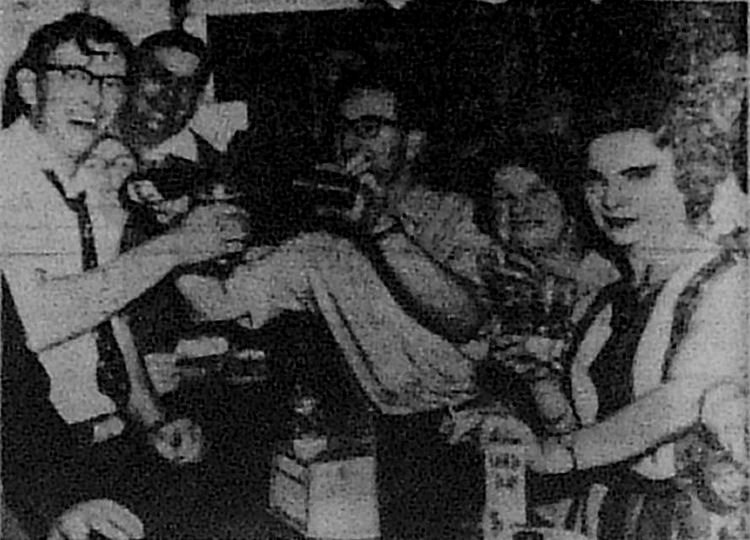
Time, gentlemen please!" ... for the last time at the Salutation Inn
on Monday night. Twelve hours later the demolition men moved in.
Time ran out for Dover's ancient Salutation Inn on August Bank
Holiday Monday, when licensee Mr. Charles Townsend called for last
orders. For over three hundred years the Salutation in Biggin Street has
provided rest and refreshment for travellers between Dover and
Canterbury. The premises and the line of shops in which they stand are
being demolished to make way for a £100,000 redevelopment scheme.
There was a touch of sadness in the three bars as they sang "Auld
Lang Syne" at closing time.
"I've made this my local for twenty years," said the old man in the
corner. "Now I'll have to scout around to find another place with the
same atmosphere as the Salutation."
A big crowd gave "The Sally" - as it is called - a good send off.
One there for the final hour was Mr. John Ullmann, of Dover
Demolition and Erection Company, whose firm is to knock down this sector
of Biggin Street.
Work began early next morning gutting Fletcher's butcher shop, which
is next door to Scrase's electrical store, still being vacated.
Almost immediately after the area has been cleared, two-storey shops
are due to be erected. A new Salutation will be built in the block.
It is hoped that the reconstruction of the area will be completed by
next June. Later, it is planned to build a telephone exchange at the
rear of the shops.
|
|
From the Dover Express and East Kent News. 30 August, 1963.
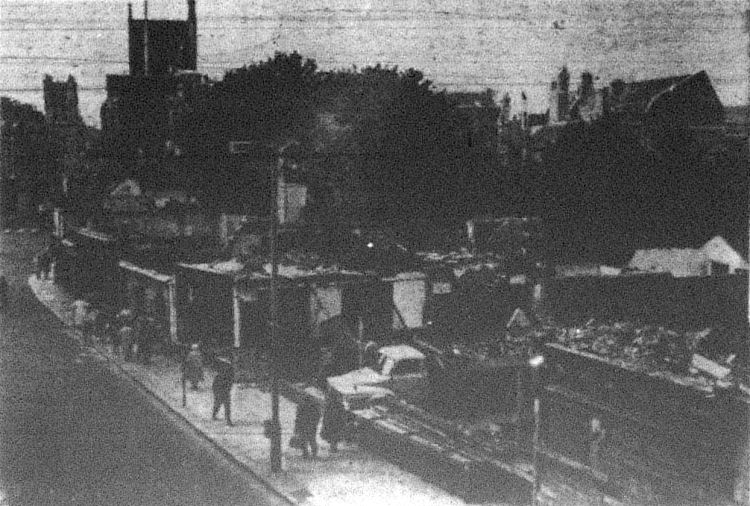
The demolition squad at work in Biggin Street
bottle-neck.
|
|
From the Dover mercury, 10 August 2001, by Joe Harman.
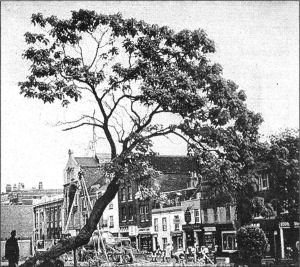
Street landmark uprooted.
THIS picture was taken during the last days of the Catalpa or Bean tree
which had flourished outside Maison Dieu House for many years. In 1963
it was decided to redevelop a part of Biggin Street. This included Hoare
Gothard and Bonds, Pearks Stores and the Salutation.
The Salutation would have been out of the picture on the left.
The old Inn was
rebuilt further down the street, but it never regained its former glory
and is now a building society office.
You can see some of the
properties on the other side which were later improved, and included the
British Queen (slightly right of centre of picture), Giddens the watchmaker, Crush the tobacconist and Parks
the fruiterer.
|
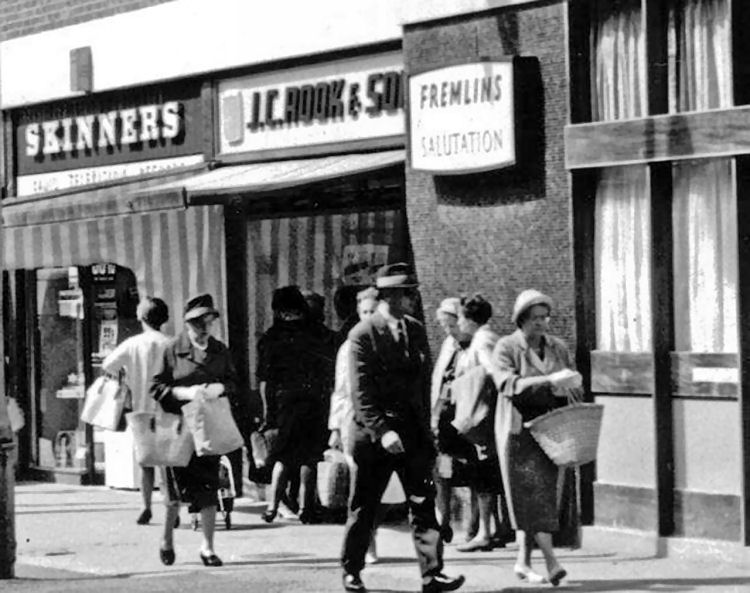
Above photo circa 1970s, kindly sent by Paul Wells. |
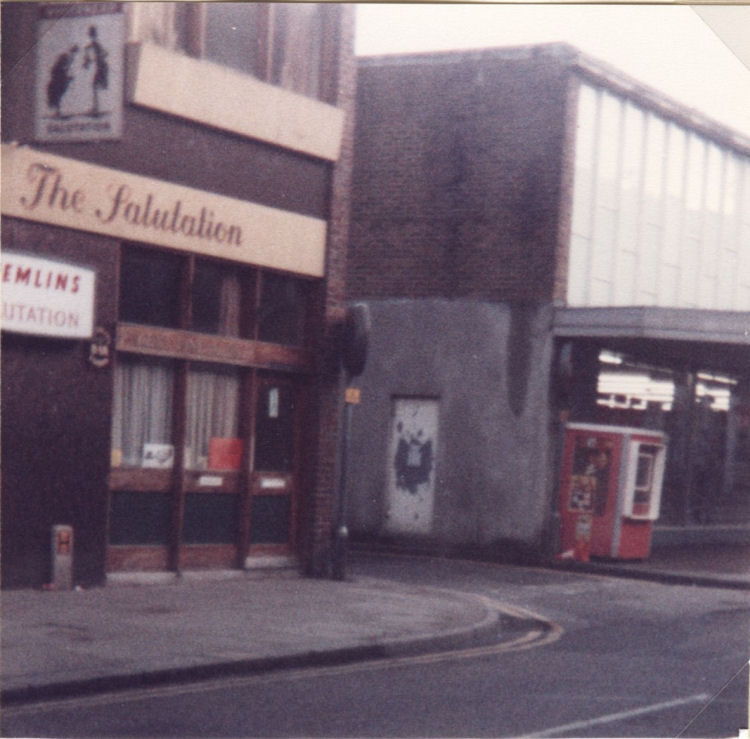 |
|
Photos of the new Salutation above and below, kindly supplied by Barry Smith,
circa 1980 |
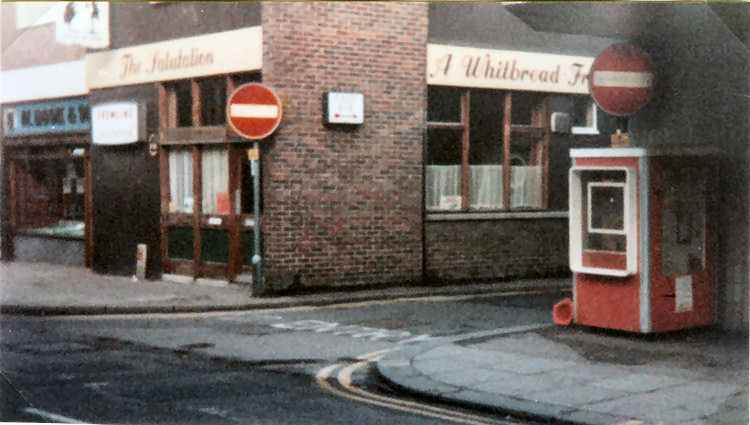
Above photo, date unknown. |
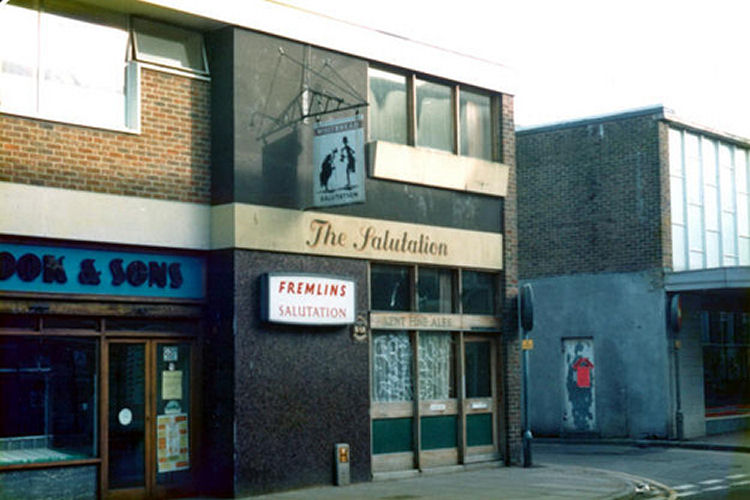
Photo by Stuart Kinnon, 1983. |
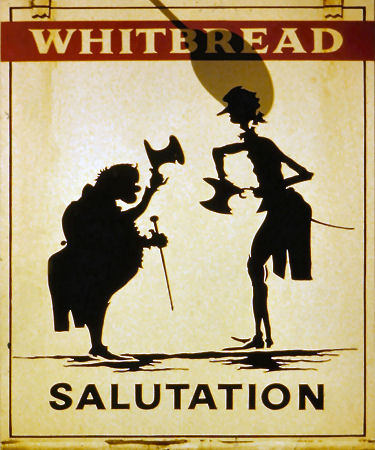
Above sign 1977.
With thanks from Brian Curtis
www.innsignsociety.com. |
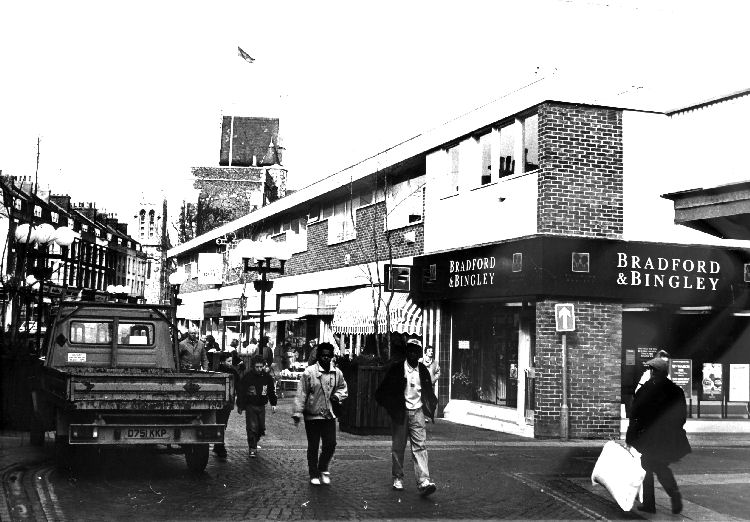 Salutation in 1991. Photo by Ivan Green 25 February 1991. By kind
permission of Dover Library ILL/3710 |
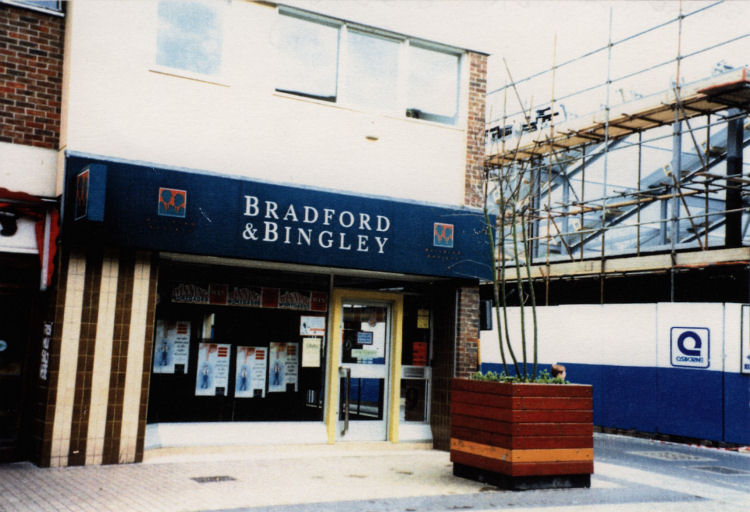
The former Salutation as it looks today. (2000ish) Although precise date unknown,
the building work on the right may be able to date this. |
The original was said to exist with the nearby monastery
in the twelfth century. One writer has suggested that the two were connected
with a tunnel or passageway. The monastery would have been much closer then
than the few remaining portions of today so I find that suggestion easy to
go along with. Its name before the Reformation was probably "Annunciation"
or possibly "Angelus" if it was present then. The sign would have changed
when the Priory met its demise with perhaps just the lily remaining. It has
been reported that when the pub was called the "Annunciation" that the sign
depicted the greeting of the Blessed Virgin Mary by the Angel Gabriel.
Supplied by Alfred Leney Co Ltd, who bought out Thomas Walker's Phoenix
Brewery in 1859 and registered as such in 1896, until bought out by Fremlin
Brothers brewery of Maidstone in 1926, brewing at the Dover brewery ceased
in 1927, which later passed to Whitbread.
When it closed on 5 August 1963 others estimated it to be
some three hundred years old. I can only say here that J. Bowes kept it in
1791 and a Mr. Bowen is known to have died there in 1794. I do recall that
it was necessary to step down into the public bar so it was easy to fall
into as it were.
It was removed in 1963 when it became necessary to widen
the pavement. Another of the same name was then built on a corner some sixty
feet from the first site.
It opened on 4 September 1964. The new black and white
sign, depicting two figures was uninspiring and suggested little to the
average person. The structure itself could hardly have looked less like a
pub from the outside.
Needless to say, it fought a losing battle for nineteen
years and closed finally on 6 December 1983. It was a Whitbread outlet.
Following alterations. Pizza Hut (UK) utilised it as a
licensed restaurant but their stay was briefer still, lasting only seven
months before giving way to the Bradford and Bingley building society.
LICENSEE LIST
BOWES J 1791-Jan/94 dec'd

KITHAM Matthias Rigden 1823-39+
   
PHILLIPS John 1838-50+
(age 40 in 1841 ) )
  
SHAVE William Nov/1850-51+ (age 60 in 1851 ) )

SHAVE Mrs 1857
EWES Thomas Feb/1858+

EVES Mrs A 1862

ARCHER John 1870-May/79
 
 CAISTOR Henry May/1879-93+
(age 59 in 1891
CAISTOR Henry May/1879-93+
(age 59 in 1891 ) )
 
 YOUNG George Charles 1895-Apr/1899
YOUNG George Charles 1895-Apr/1899

  
 HALL Edward Apr/1899-Jan/1905 dec'd
HALL Edward Apr/1899-Jan/1905 dec'd
   
HALL Mrs Adeline (widow) Jan/1905-Aug/06

STEPHENSON Mrs Adeline Aug/1906-07 end (Remarried)

DALTON W L 1907-10 dec'd

DALTON Mrs E A 1910
WRIGHT George Mcintyre 1911 end (age 57 in 1911 ) )
 GILLESPIE Frederick John 1911-Aug/12
GILLESPIE Frederick John 1911-Aug/12

CASSELDEN John C Aug/1912-13+

 
WEEKS Thomas Henry 1916-17 end

BRYANT John Thomas 1919-9/Apr/20 dec'd
BRYANT Mrs 1920+
TUCKER Charles Cyril to Mar/1922
 
KIDD Albert Mar/1922-Oct/23
 (Late of
Royal marines, Deal) (Late of
Royal marines, Deal)
BUSHELL Frederick William Oct/1923-24
 (Of the
Shakespeare Mews) (Of the
Shakespeare Mews)
BARTLETT John Charles 1924-Apr/27 ( BARTLETT J E) BARTLETT J E)
WYATT James Apr/1927-30
  (Retired army officer)
(Retired army officer)
 HUNT Mrs Mary Ann 1930-June/33
HUNT Mrs Mary Ann 1930-June/33

AMES Thomas June/1933-July/36

BOWLER Frederick John July/1936+

NODDER Stanley Charles Sept/1938 end
  
 BOTLEY John Sept/1938-June/40
BOTLEY John Sept/1938-June/40

HARTE Thomas James June/1940-55
   
PHILLIPS John W 1946-50
TOWNSEND Charles Victor 1955-63

(New pub)
SUMMERS Frederick D 1964-77 retired
 Whitbread Fremlins
Whitbread Fremlins
MILES Derek J 1977-83 end
According to the Dover Express, John Botley was from 39, Cheriton Road,
Folkestone, formerly licensee of the "Ship," Minster.
Thomas James Harte was previously from Southampton, Hotel Surbitan,
cellarman.
Frederick John Gillespie may well have been landlord of the "Fountain" in
Hastings in 1918.
 Dover and Deal Directory and Guide 1792 Dover and Deal Directory and Guide 1792
 From the Pigot's Directory 1823 From the Pigot's Directory 1823
 From the Pigot's Directory 1828-9 From the Pigot's Directory 1828-9
 From
the Pigot's Directory 1832-33-34 From
the Pigot's Directory 1832-33-34
 From the Pigot's Directory 1839 From the Pigot's Directory 1839
 From the Pigot's Directory 1840 From the Pigot's Directory 1840
 From Bagshaw Directory 1847 From Bagshaw Directory 1847
 From Melville's Directory 1858 From Melville's Directory 1858
 From the Post Office Directory 1862 From the Post Office Directory 1862
 From the Post Office Directory 1874 From the Post Office Directory 1874
 From the Post Office Directory 1882 From the Post Office Directory 1882
 From Pikes Dover Blue Book 1895 From Pikes Dover Blue Book 1895
 From the Kelly's Directory 1899 From the Kelly's Directory 1899
 From the Post Office Directory 1901 From the Post Office Directory 1901
 From the Post Office Directory 1903 From the Post Office Directory 1903
 From the Kelly's Directory 1903 From the Kelly's Directory 1903
 From Pikes Dover Blue Book 1909 From Pikes Dover Blue Book 1909
 From the Post Office Directory 1913 From the Post Office Directory 1913
 From the Post Office Directory 1922 From the Post Office Directory 1922
 From Pikes Dover Blue Book 1924 From Pikes Dover Blue Book 1924
 From the Post Office Directory 1930 From the Post Office Directory 1930
 From Pikes Dover Blue Book 1932-33 From Pikes Dover Blue Book 1932-33
 From the Post Office Directory 1938 From the Post Office Directory 1938
 From Pikes Dover Blue Book 1938-39 From Pikes Dover Blue Book 1938-39
 From Pikes Dover Blue Book 1948-49 From Pikes Dover Blue Book 1948-49
 From the Kelly's Directory 1950 From the Kelly's Directory 1950
 From the Kelly's Directory 1953 From the Kelly's Directory 1953
 From the Kelly's Directory 1956 From the Kelly's Directory 1956
 Library archives 1974 Library archives 1974
 From the Dover Express From the Dover Express
 From the Dover Telegraph From the Dover Telegraph
 Census Census
|














